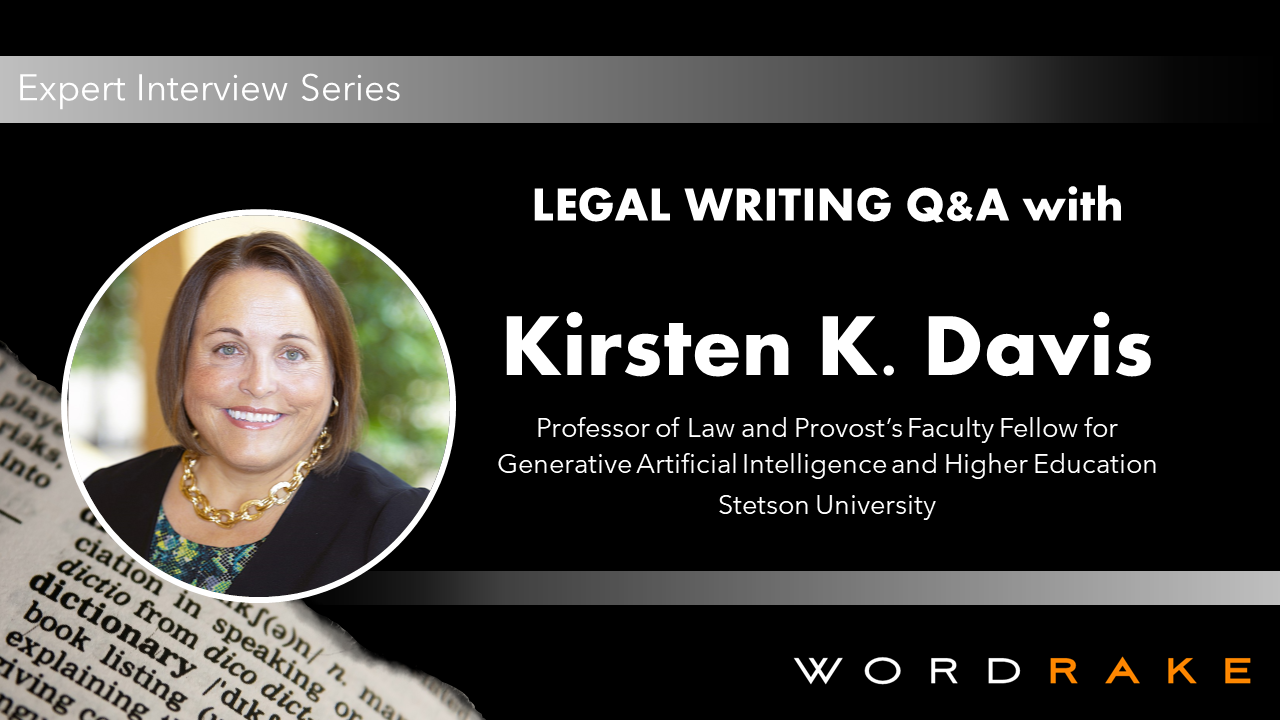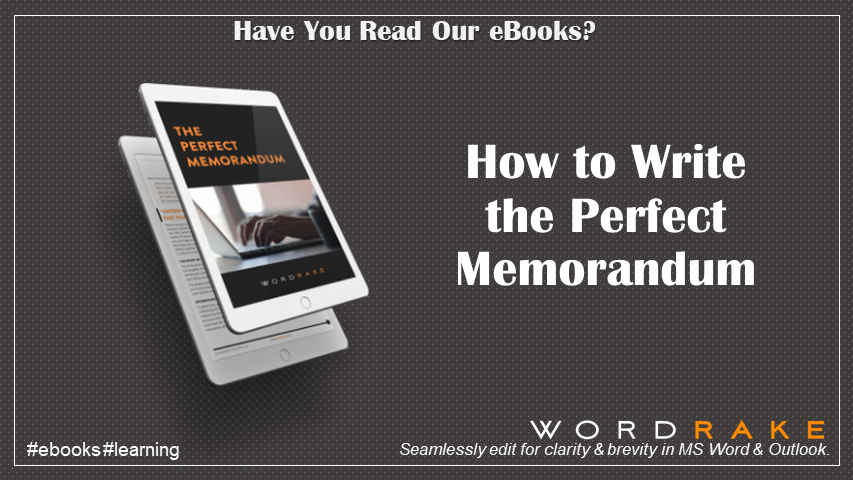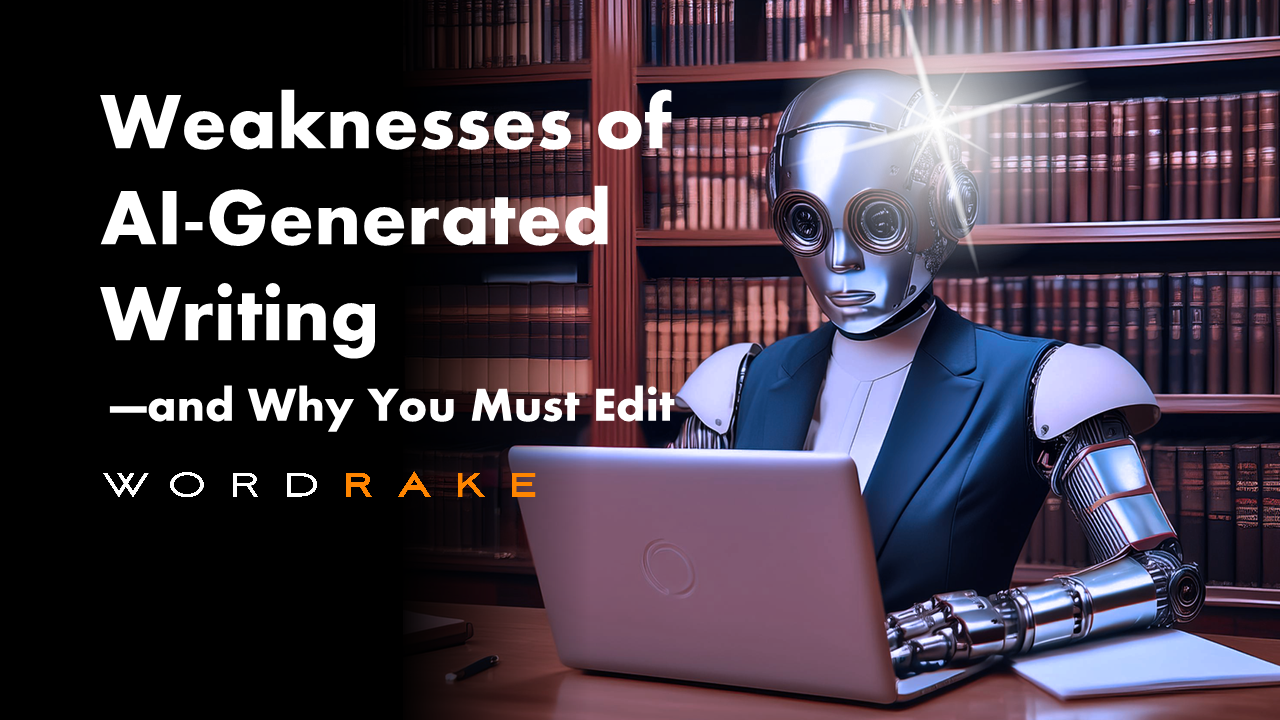Legal writing is at a crossroads. When ChatGPT passed the bar exam, it became impossible to ignore the possibilities that generative AI holds for legal writers. Professor Kirsten K. Davis spent her 2023 sabbatical exploring AI technology, and now teaches law students how to use it effectively in their writing practice. She shared some of her insights in her legal writing interview:
What is your role and how did you get to where you are today?
I am a Law Professor and the Provost's Fellow for Generative Artificial Intelligence and Higher Education at Stetson University. I have been a professor for nearly 25 years, 17 of those at Stetson. I'm a farm kid from Ohio, and I received my BA and JD from The Ohio State University. Later, I earned my Ph.D. in Human Communication from the Hugh Downs School of Human Communication at Arizona State University.
After teaching at ASU, I joined Stetson to direct its legal writing program. I primarily teach legal writing and professional responsibility, and occasionally, I teach the First Amendment. I'm excited to offer an Advanced Legal Writing course, Legal Writing with Generative AI, for the second time this spring. I focus on human communication and ethics in legal settings for my research interests, emphasizing exploring technology's impact on those topics.
What made you decide to focus on the growth of generative AI in legal practice?
My perspective on legal writing comes mainly from my advanced training in human communication and rhetoric. When I experimented with generative AI during my sabbatical in Spring 2023, I recognized that this new technology would be paradigm-shifting for all aspects of legal communication, especially writing. Legal writers have never encountered, let alone used, a technology that can generate human-like communication at this scale. Given the significant impact I expect generative AI to have on the legal profession and my interest and expertise in legal writing and legal ethics, it was a natural fit to start studying how legal education and practice can adapt to this new reality.
How do you think about AI and Legal Writing? Is there an ethical way for legal writers to use AI in their practice?
I think about AI and legal writing just like I think about all legal writing, as a rhetorical practice. Human interaction with and about language is about meaning; rhetoric is how we craft and interpret that meaning. Generative AI will significantly influence how legal writers create and assign meaning via language. This means that legal writers must be even more rhetorically skilled and sensible when using genAI. They will need to learn to work with generated texts, prompt for them, edit and evaluate them, and use them to assemble documents. These activities require new and revised rhetorical practices. And lawyers will need to learn them.
Lawyers can use generative AI ethically in their practice. Many states now have ethics advisory opinions on this subject, and none deem generative AI use unethical. Instead, they describe the ethical limits lawyers must adhere to for responsible generative AI use. Among all the ethical obligations for generative AI use, I think critical ethical keys include maintaining client confidentiality, producing reliable and competent content, and not outsourcing one's own judgment when using generative AI.
It's important that lawyers check to see if their state has an ethics opinion. The American Bar Association has ethics guidance as well. In addition, some courts have specific rules for generative AI use in practice before them, and lawyers should be aware of those rules as well. It is a minority view, but a few courts have prohibited generative AI use in documents filed with the court.
But it's not just legal ethics that should concern lawyers; communication ethics are essential, too. For example, if a lawyer writes a letter using generative AI to draft the document, is that letter an authentic communication of its purported author? Should a recipient be made aware that this letter is AI-generated in whole or part? Suppose some ideas—not just their expressions—were "thought of" by generative AI and not by the lawyer autonomously. Would the lawyer misrepresent something in the letter by including those "borrowed" thoughts? While consent and notice are addressed to some degree in many state ethics opinions, not all aspects of ethics are encompassed in formal ethics rules. These are some of the communication ethics questions on my mind.
In the age of AI, is good legal writing a valuable skill? What do you expect to change?
The ability to produce legal writing is an even more valuable skill than ever; however, the skills necessary to produce good legal writing will transform as generative AI becomes more ubiquitous in practice. Some of these skills include effectively writing and designing prompts, evaluating AI-generated text for accuracy and reasoning, assembling documents that include generative AI artifacts, and thoughtfully editing generative AI texts. Lawyers will need to learn to read more critically and better understand the rhetorical situation to effectively work with generative AI models. For example, when designing prompts, lawyers will be only as successful in generating useful text as their proficiency in expressing the method of legal writing will allow. Lawyers must be able to think critically about the audience, tone, and purpose of their writing when generating, evaluating, and editing legal texts. They will need to have skills that ensure they can guard against over-reliance on generative AI.
I think legal writing education will change to become more process-centered to enable students to spend more time engaged in the writing process and get feedback on those process steps. Proficiency in hybrid human-AI writing will require mastering and critically reflecting on the legal writing process.
How do you teach about tech and writing?
I am teaching a second-semester course for 1Ls this spring on "technology-infused" persuasive legal writing. This title comes from my view that technology and writing are not, and probably never have been, separate. If we think back to even the earliest forms of recorded writing, they involved some sort of tool developed by human ingenuity, like a chisel to make markings in stone. We tend not to think of those creations as "technology," but they are. Today's writing technologies have long included digital technologies like the computer and, more recently, the algorithmic tools that drive computer applications designed for writing.
When I think about teaching legal writing, I conceptualize the tools students will use to produce that writing as inextricably intertwined with the legal writing process. As such, I want to equip students with the power to evaluate technologies as part of ideation, research, drafting, revising, and editing. Students should be able to identify the relevant decision points and make deliberate and thoughtful choices. With the arrival of generative AI, teaching technology as part of the legal writing process becomes even more important.
What do you say to lawyers who fear tech because they don't want to seek "outside" help for their work?
Lawyers should not fear generative AI because they see it as outside help. Instead, they should think about how they can use genAI, like any other technology tool, to serve clients by improving the quality and efficiency of their written work. Generative AI is only "outside help" if the machine takes over the lawyer's professional judgment. But if a lawyer stays in the driver's seat, generative AI becomes the lawyer's collaborator—an insider, not an outsider—in the writing process. This is not something to fear; instead, it represents how we adapt to the evolution of writing technology, like the move from pen to typewriter to computer.
About Kirsten K. Davis
Kirsten Davis is a Professor of Law and the Provost’s Faculty Fellow for Generative Artificial Intelligence and Higher Education at Stetson University in Gulfport, FL. She graduated from The Ohio State University Moritz College of Law and earned a Ph.D. in Human Communication from the Arizona State University Hugh Downs School of Human Communication. Prior to joining the faculty at Stetson, she was a federal judicial clerk, an attorney, and a faculty member at the Arizona State University Sandra Day O’Connor College of Law.
Dr. Davis’s work focuses on the intersection of legal communication and legal ethics. Most recently, she has been studying the impact of generative artificial intelligence on legal communication, legal ethics, and higher education. This past year, she has given talks on generative AI to law faculty, law students, administrators, lawyers, and judges. She is leading a group of over 400 law professors who are exploring the impacts of Generative AI on legal writing education and practice. Among other courses, she teaches Legal Writing with Generative AI, at Stetson. Her essay, A New Parlor is Open: Legal Writing Faculty Must Develop Scholarship on Generative AI and Legal Writing argues that generative AI represents the beginning of a paradigm shift in legal writing and identifies the “big issues” of legal writing that will need scholarly investigation.
Dr. Davis has served on the board of directors of the Association of Legal Writing Directors and the Legal Writing Institute. She is a past chair of the Association of American Law Schools Annual Meeting Program Committee and of its Section on Women in Legal Education. She is also a past Chair of the Florida Bar's Standing Committee on Professionalism and served on its Special Committee to Review Professionalism. She currently serves as the Program Co-Chair for the AALS Section on Technology, Law, and Legal Education; as a member of the Legal Writing Institute’s AI Committee; and as a member of the Florida Bar Standing Committee on Technology.
This past year, the AALS Section on Technology, Law, and Legal Education selected her for its Inaugural Technology Mentorship Award. The ABA Legal Technology Resource Center named her to its distinguished Women of Legal Tech list for 2024.
About the Legal Writing Interview Series
WordRake founder Gary Kinder created the software to help legal writers edit for brevity and simplicity. In continued dedication to the most effective legal writing, this Series highlights the experience and advice of experts from professors to writing coaches to litigators. Looking to help boost your legal writing skills? Get a free 1-week trial of WordRake here.









